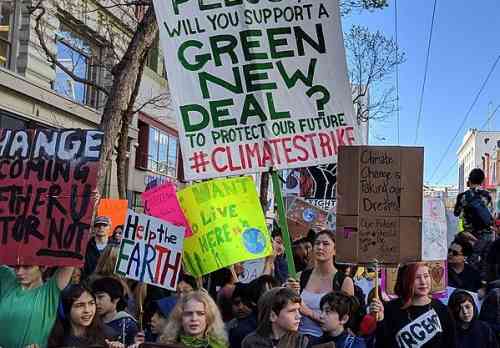Political Movements: the Role of Political Orientations

Protesters march with signs along Market Street during the San Francisco Youth Climate Strike. March 15, 2019. Photographer: Intothewoods7. Cropped from the original.
What provokes political movements? They can only occur because a large number of individuals decide to cooperate with one another to obtain a political outcome they mutually value. Not everyone joins the same political movements, even if they share the same circumstances. And it’s not because some people have more information than others, or some have been “brainwashed.” Often it’s because of individual differences in political orientations and value priorities.
Years ago I published a thesis concerning the origins of political conflict within social groups [copy here]. The substance of the theory is this: People interact with other people largely based on the benefits and costs they expect from the interaction, and they expect the benefits [social and/or economic] to outweigh the costs. This is well-supported by research documenting "reciprocity" as a general principle of human behavior. The corollary is this: When group members observe that they are not receiving the benefits they expected, they become frustrated. Then "...frustration produces an instigation to aggression," as noted by Psychologist Leonard Berkowitz [p. 44]. He also noted that “social unrest and even revolutions” can result [p. 37]. It was my surmise that, when people protested against injustice or complained about unfairness, they were not experiencing, or they anticipated not receiving, the level of economic and/or social benefits that they had expected. In brief, violation of expectations is the root of political protest.
I think this principle is amply demonstrated by the current protests in Hong Kong, Ecuador and Chile. The Hong Kong protests began after the local government proposed a law that would allow, in contrast to previous laws, the extradition to China any individual identified by China as a “fugitive.” For many residents of Hong Kong, this was a violation of their expectations with regard to Hong Kong’s autonomy and civil liberties. The protests in Ecuador began after the government ended gasoline subsidies which had been in place for decades. The sudden, dramatic rise in gas prices violated the expectations of many Ecuadorians who would lose income as a result. The protests in Chile began after the government announced it would increase the cost of public transit, when those costs already amounted to almost 14% of the monthly minimum wage.
But now I can refine the general theory a little more. As I’ve noted in other essays [e.g., here], there’s a growing body of evidence that populations commonly include people who have different, even conflicting, value priorities for their social interactions. There appear to be naturally occurring divisions between those who place high values on hierarchy and traditional culture and those who place greater value on equality and cultural freedom.
Those who place higher value on hierarchy and traditional culture will expect benefits/rewards based on established hierarchies or traditions. They’ll get more frustrated, and more aggressive politically, if they see threats to their hierarchies or traditions. That was the argument in my essay about the rise of right-wing racial and ethnic nationalism. I think it’s also been a factor in the U.S. anti-abortion movement and Tea Party movement.
At the same time, those who place a greater value on equality and cultural freedom will be looking for interactions which are more equally beneficial and not restricted to traditional culture. They’ll get more frustrated, and more aggressive politically, when they see inequality in the distribution of social or economic benefits, and/or restrictions based on cultural traditions. It’s my surmise that this has been the basis for U.S. movements which have demanded social change and equal rights, such as the Abolitionist movement, the Suffragist movement, the Civil Rights movement, the Labor Union movement, and the Climate movement, among others. I think it’s fair to suggest these movements were Liberal or left-wing movements. They triggered backlashes from Conservatives, for one thing.
I’m reminded of an old social theory that’s reportedly been around since 1949: the theory of “relative deprivation.” The theory has been presented many different ways over the years, but I think it boils down to this:
“The initial concept of RD [relative deprivation] is simple: persons may feel deprived of some desirable thing relative to their own past, another person, persons, group, ideal, or some other social category.”
.
It’s been found to exist in many social settings. In the original study,
“Samuel Stouffer... found that U.S. Army Air corpsman reported more frustration over promotions in comparison to the military police even though they enjoyed a much faster rate of promotion. Stouffer maintained that the military police were not the relevant comparison for these airmen; within their Air Corps group, they knew many similar peers who had been promoted. He hypothesized that it was comparisons to these peers that produced RD.”
.
Humans aren’t the only ones who experience this, by the way. Frans de Waal shows in a video what happens when one monkey gets watery cucumber rewards, while her neighbor gets some sweet, sweet grapes:
.
Political orientations may add another dimension to Relative Deprivation theory: the likelihood of a political movement increases as people with pronounced political orientations perceive that they are, or likely will be, deprived of their value priorities (tradition, dominance, cultural freedom, or equal treatment) relative to their expectations for such.
This is one reason why our social lives amount to what William Graham Sumner called “antagonistic cooperation” [Folkways, Ch. 1, Sec. 21]: “the combination of two persons or groups to satisfy a great common interest while minor antagonisms of interest which exist between them are suppressed.”

We form social groups for the sake of mutual aid and sustained reciprocity. But there’s almost always a latent contradiction of value priorities, and therefore of reward goals, among members. So it’s likely that there will be moments of social conflict from time to time.
Why does this condition exist? There’s evidence which suggests it may actually help large groups to survive! That’s one of the topics I hope to address in another essay I’m writing.
.
Afternotes:
1. I just have to say it:
The Arc of History May Bend Toward Justice, But It Doesn’t Bend Itself!
(Apologies to Rev. MLK, Jr. and Rev. Theodore Parker)
2. When considering a life partner, you might want to make sure your political orientations are compatible. Degrees of traditionalism may be clear, but degrees of dominance orientation and egalitarianism may be less obvious...or easier to dismiss. But differences in dominance orientation and egalitarianism can be just as problematic for relationships, if the partners are significantly dissimilar on these dimensions. Says a friend with experience.
3. There’s a line of research in “relative deprivation” theory which emphasizes a distinction between relative deprivation experienced as an individual (“egoistic”) and as a group (“fraternal”). [See, e.g., here] My surmise is that the experience always originates within individuals, and it becomes group-based when it’s perceived that other people share the same experience.
4. I want to thank all of the scholars making the fruits of their research available online without charge. As a pensioner, with no institutional support, there’s often no other way for me to obtain these materials.

